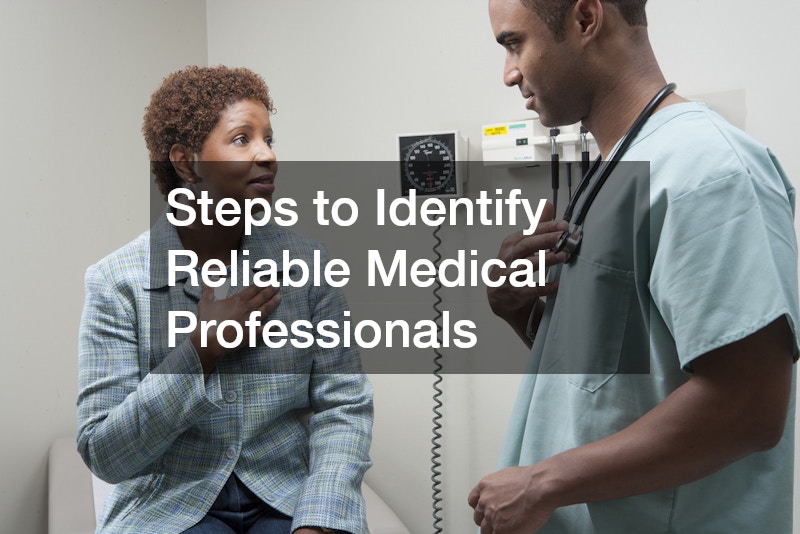Research and Gather Recommendations
When searching for reliable medical professionals, a crucial first step is to conduct thorough research and gather recommendations from trusted sources. This process begins by seeking suggestions from family members, friends, or colleagues who have had firsthand experience with medical professionals in your area. Personal recommendations can provide insights into the quality of care provided and help assess the level of trustworthiness of a healthcare provider. In addition to personal networks, online platforms and healthcare forums can serve as valuable resources for patient reviews and ratings of medical professionals, as they offer a broader perspective from diverse patients.
It’s essential to compile a list from multiple sources to compare and validate the reliability of the healthcare providers under consideration.
Alongside personal recommendations, professional healthcare databases and directories are indispensable tools in identifying reliable medical professionals. Websites and organizations that offer verified lists of practitioners, such as the American Medical Association or local medical boards, help ensure that the professionals you are considering have a legitimate practice and proper credentials. It’s equally important to verify their certifications and check for any incidences of malpractice, as these factors contribute to the reliability of the medical services they provide. Trustworthy medical professionals often hold certifications from reputable boards in their specific field of expertise, guaranteeing they adhere to the highest standards. Exploring these directories not only facilitates informed decisions but also provides a sense of security in selecting qualified practitioners.
Community and non-profit organizations dedicated to health advocacy are also excellent sources for recommendations and guidance. These entities often conduct independent evaluations and advocate for patient rights, offering unbiased insights into the reliability and reputation of various medical professionals. Engaging with these organizations can help clarify doubts and ensure that the practitioners considered have a track record of ethical conduct and satisfactory patient outcomes. Moreover, these groups frequently collaborate with healthcare institutions, offering an additional layer of validation regarding the practices of specific medical professionals. By leveraging such resources, one can better navigate the complexities of healthcare and ensure a more reliable choice.
Evaluate Credentials and Experience
A vital step in identifying reliable medical professionals is evaluating their credentials and clinical experience. Verifying a practitioner’s educational background and training is fundamental to understanding their qualifications and competency. Medical professionals should have completed accredited programs and hold valid licenses from recognized medical boards, which indicates they adhere to specific ethical and professional standards. Additionally, assessing the years of practice and areas of specialization can provide insights into their expertise and capability in handling specific medical conditions. This information is usually accessible through state licensing boards, professional organizations, or directly from the healthcare provider’s office, ensuring transparency in their qualifications.
Beyond educational credentials, the track record of a medical professional’s experience plays a crucial role in their reliability. Experience often correlates with proficiency, as practitioners who have managed a variety of cases are usually better equipped to handle complex scenarios. Reviewing the practitioner’s history in terms of patient outcomes, involvement in innovative treatments, and continued education can be revealing of their commitment to their profession. Engaging in continuous medical education and attending relevant workshops or conferences signifies a healthcare provider’s dedication to keeping abreast of advancements in their field. This ongoing education is critical in providing updated, evidence-based care to patients and enhancing their reliability in addressing diverse medical needs.
Consider Communication and Compatibility
Communication and compatibility are essential elements when selecting reliable medical professionals, as they significantly impact patient satisfaction and healthcare outcomes. Effective communication ensures that patients clearly understand their medical conditions, treatment options, and the rationales behind specific medical decisions. Medical professionals who listen actively and respond to patient concerns foster a therapeutic partnership built on trust and mutual respect. Moreover, the ability to explain complex medical jargon in understandable terms is crucial to empowering patients in their healthcare journey. Compatibility, on the other hand, involves aligning patient expectations with the practitioner’s treatment philosophy and approach, ensuring a cohesive and personalized healthcare experience.
Assessing a healthcare provider’s communication style begins during initial consultations, where patients can observe the practitioner’s attentiveness, willingness to answer questions, and ability to establish rapport. Reliable medical professionals prioritize patient-centered care, valuing the patient’s input and cultural considerations in their care decisions. A practitioner who respects patient values and preferences while providing guidance is more likely to engender trust and adherence to medical advice. Compatibility encompasses not only interpersonal dynamics but also logistical factors such as office hours, availability in emergencies, and ease of appointment scheduling. Ensuring these elements align with personal needs is vital for a smooth and satisfactory healthcare experience.
Language proficiency, cultural competence, and a non-judgmental approach are additional facets contributing to effective communication and compatibility. Medical professionals adept at engaging with diverse backgrounds can better address patients’ cultural sensitivities and health beliefs, providing inclusive care. Understanding these dimensions helps in selecting practitioners who can bridge communication gaps and cater to specific patient needs. This cultural alignment enhances engagement in care processes, leading to improved adherence to treatment plans and ultimately, better health outcomes. Therefore, considering communication skills and cultural compatibility significantly contributes to identifying reliable medical professionals who can provide comprehensive and respectful healthcare.
.

